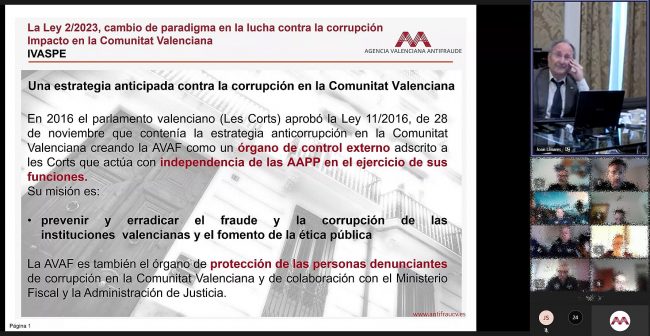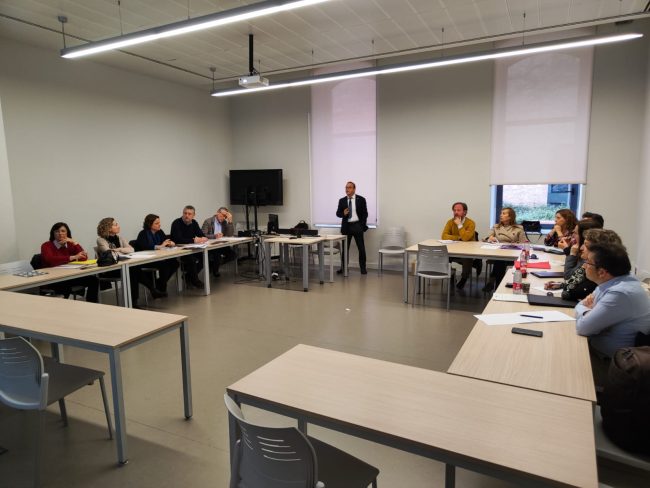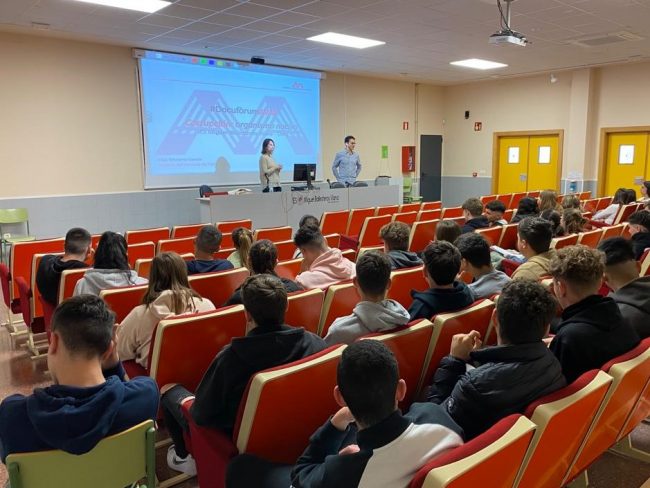#TrainingAVAF
The Valencian Institute of Public Security and Emergencies (IVASPE), an organization with 32 years of experience and which has professionally trained more than 70,000 police officers and emergency personnel in the Valencian Community, has included in its selective courses of technical and superior level of Local Police, training sessions given by the Valencian Antifraud Agency (AVAF).
On this occasion, we have participated in the training of the 45th and 46th editions of the selective course of the technical scale for access to the categories of inspector and mayor of the local police and the 46th and 47th editions of the selective course of the scale superior for access to the categories of commissioner and main commissioner of the local police. Both courses promoted by the head of the IVASPE Training Area, Juan Vicente Hernández Pamplona; and coordinated by the mayor of the local police of Elche, José Eugenio Medina Sarmiento.
The training days with the two courses were taught online on March 27 for the Elche group and on April 3 for the Cheste group. On both occasions the training was carried out by the director of the Valencian Anti-Fraud Agency, Joan A. Llinares Gómez, with a conference on “Law 2/2023, a paradigm shift in the fight against corruption. Impact on the Valencian Community”.
The training was based on the obligations derived from Law 2/2023 such as: the implementation of internal channels in the different administrations, the existence of the external complaints channel available in the AVAF since 2018; whistleblower protection, regulated by Law 11/2016 of the Generalitat and Law 2/2023; and the Independent Administrative Authority and its equivalent in the Valencian Community, the AVAF as the competent autonomous authority.
Fifty-eight students from the technical and superior corps of the Local Police participated in the training sessions, coming from 36 municipalities of the Valencian Community.
The training served for the students to learn more about the work of the Agency and its powers, since both institutions collaborate in their actions to improve integrity in the public sector. The participants showed interest in the treatment given to the anonymous complaint, the false complaint and the sanctioning power, being a body that is also familiar with the complaints.
The Agency thanks IVASPE for including these training days in its standardized courses, as well as the interest shown in the functions and powers of the Agency in the interest of greater collaboration and the obligations derived from Law 2/2023.
If you wish to have specialized training in integrity and corruption prevention in your public administration, do not hesitate to write to training@antifraucv.es





 The protagonists of the learning experience have been the students of the economics subjects of 4th of ESO, 1st and 2nd of Baccalaureate, thanks to the collaboration of the responsible teachers, Antonio Pozo and José María Escribanos.
The protagonists of the learning experience have been the students of the economics subjects of 4th of ESO, 1st and 2nd of Baccalaureate, thanks to the collaboration of the responsible teachers, Antonio Pozo and José María Escribanos.